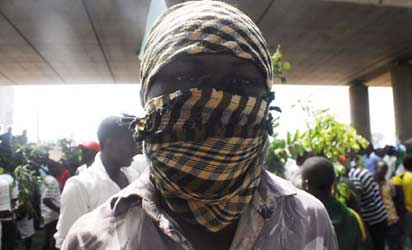Toma, 27, was born and
raised in Lagos alongside three siblings, where she attended local primary and
secondary schools before getting married off at 16 and then going off to live
in North Eastern Nigeria with her husband.

In Adamu’s village, the Boko Haram
phenomenon was just a kind of rumour when she first went to settle there with
her husband as a new bride around 2012, Toma recalls as she settles down to
speak to WW in impeccable English, wearing a grey tired robe and light cotton
hijab, interjected now and then by one or the other of her children.
Before this she had lived in Lagos all
her life, but she was not very worried. Her eldest brother lived just a few
villages away with her grandfather, where her great grandmother also lived. “We
are suffering, we are suffering a lot here.
It seems as though the whole of Nigeria has
forgotten us”, she repeats over and over again. According to Toma, there were
market days in the beginning, every 3-4 day whereby sellers would assemble at a
nearby market to sell and buy various grains, oils and other items. Asked about
meat she responds that this could be bought at the cattle market.
“We had goats
and rams in the village but these too became a thing of the past”.
It had become increasingly difficult to go to
the market to buy food, or anywhere else. Thanks to stories of people who went
and never returned to tell the stories, market days thinned out and eventually
became a thing of the past.
Food had to be rationed painfully, with no idea
where to get the next supplies from. “You would go to the market”, she
recounts, “and you would come back and they have raided the village, taking all
our grains”.
Toma’s father passed away many years ago, but
her mother had remained in Lagos, struggling to raise her other children on her
own; so why did she not phone someone? Telecommunications was one of the first
things to go in the village . One day, the mobile phones worked, the next they
did not.
There was no transportation either, not
even motorcycles that had once been popular before this time. People would walk
for miles before finding a motorcycle. If they were lucky, it would not be a
Boko Haram member.
Often, it was. But if Boko Haram was
killing ‘their own people’, is that not pretty odd, given that these were
strong Muslim communities? Toma’s grandfather was even the chief Imam at his
own village, and he was grooming her brother to take his place. She shakes her
head vigorously. “ This is another misconception people have.
The Boko Haram people target us in
particular (the Arabs)”. So who are these people? Can she recognize a Boko
Haram member if she saw one? “They are those very dark people with very tiny
facial marks like xxxxx (she mentions the name of a very prominent politician).
But these days it is difficult to tell.
One day they lynched one boy hanging about the
market, that he was a Boko Haram informant, but he may or may not have been.
People started warning their boys not to hang around anyhow so they would not
be mistaken for Boko Haram. We have even heard of Ibo (Igbo) Boko Haram
members.
We heard that they offer them money and
they join”. When Boko Haram started sending threat messages to Toma’s village,
residents had only one of a few choices. Some escaped into Cameroun, but that
was getting more and more difficult by the day.
Toma knows this because on the
rare occasion when she could reach her family in the other village, her uncle
and grandfather would talk about going there but her great grandmother would
have none of it. Eventually, she was killed by Boko Haram.
Her brother found
his way to Maiduguri, which was still a functional city despite remote
incidences and threats of them. From there, he found his way to his mother in
Lagos. “It is much easier to get anywhere from Maiduguri”, she explains.
But the family of her husband decided
to stay. They did not really have any other home, though he also had some
family in Lagos. As the threats escalated, Toma began to intervene, begging her
husband to let them leave with their two children. She was pregnant with the
third. “Sometimes they would surround our village every night and warn us. It
was very frightening”. So, if it was so difficult to get food and other
supplies, how did Boko Haram get theirs? “We saw aircraft in the air dropping
supplies for them”, she reveals. “They would drop it in a way that they would
get it but we would not. It was very expertly done”. Eventually, Toma was able
to persuade her husband and some members of their family to leave.
It was a lifesaving move as their village was
sacked only a few days afterwards They left in the dead of night, and at this
point she was eight months gone on the pregnancy.
With two young children to care for in
addition, it was an arduous journey. Before long, she was exhausted and they
had to hide in the bush.
Read more at: https://www.vanguardngr.com/2018/08/encounter-how-a-fulani-herdswoman-saved-me-from-boko-haram-survivor/


No comments:
Post a Comment